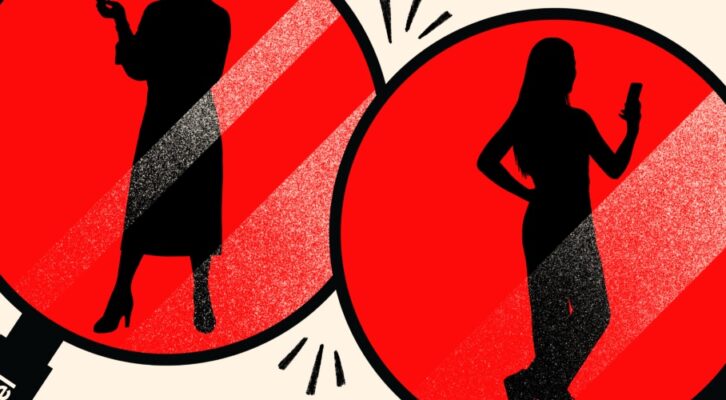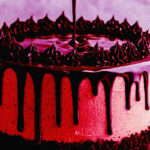My hotel in Winnipeg was full of families down from the north for a big hockey tournament. Teenagers raced through the corridors, whooping up victories. The big lobby and dining room were packed with groups of people jouncing their babies and smoking one cigarette after the other. They spoke over and around each other in one of the northern languages, clipped and consonant-happy. The smaller boys lined up to play the lone video game, Big Buck Hunter. Whenever I walked through, I could hear the crash of rifle shots and the tinny game voice congratulating players: “Ooh-wee, that’s pretty good shootin’!”
The sun in Winnipeg is luxuriously bright; it shines almost every day. The sky is extravagant, falling straight down to the ground like rain. The snow-coated city gleamed through the dining room windows. I would watch the weather forecast before going out, a cheery report with scattered cartoons of clouds and suns and adjectives. Quebec was “chilly” and Nova Scotia was “breezy.” The map of Manitoba always had a cartoon of a smiling sun and the weather was invariably described as “cool,” with the temperature hovering around –15° Celsius. I wore long underwear, a thick sweater, my warmest coat and a wind shell, and stopped at the door to pull on ski gloves and a heavy fleece hat. Everyone else seemed content with light jackets and bare hands.
I was staying near the confluence of the Red and Assiniboine Rivers, like a lot of visitors to Winnipeg. The rivers define the city’s shape, and meet at a place known for eons as the Forks. On the narrower Assiniboine, where the banks and trees block some of the wind, crowds of people skated on long, groomed runs. Others played hockey and curling. Trains passed almost overhead, across the lower span of the Osborne Street Bridge, through the city and back into the prairie. The curlers’ ritual shouts—“Sweep it hard! Hard-hard-hard!”—rang out and then were lost in the rattle of the trains.
Winnipeg was a city I had never seen before, a city where I knew no one at all. I had come north beset by loneliness. My life had become a jigsaw, fragments of selves all piled up, fighting with each other. The conflicts were deep in the bone. I had wanted to do so many things; I spent decades in a noisy spill of drive and desire, pursuing ambition and adventure, digging into family life, withdrawn into writing, pushing deep into religious practice, as though each were a whole life, as though I had enough to give to each of these whole lives. I shortchanged everything, and dug deeper, and tried harder, until I found myself in middle age, doing nothing well. Yet I couldn’t leave any of my half-selves behind. I couldn’t quit, not on my own, but my life was beginning to quit me.
More than 90 percent of Manitoba’s population lives in or near Winnipeg; the city sits like the anchor at the bottom of an ocean of land. Winnipeg is a sturdy city, blunt and industrious—a city of art and ethnic culture and financial dealing, with museums and universities and a good symphony, but I was having trouble ordering breakfast. Twilights were strange and violet, and at night the streetlights were orbs against the black sky. The lancing wind shot down the streets through canyons of shiny buildings, sharp as a pick—a wind that had come a thousand miles across the prairie and had a long way still to go. The city has a lot of open spaces, lovely fields and meadows folded over and over by the eons like a blanket. There are countless trembling aspens and bur oak, stands of willow, maple, elm, and ash. I walked through the many parks—walked alone, passing convivial groups of cheerful people—and up the low hills to look out on the plains, to look across a flat sea of snow that seemed both empty and taut with secrets. But the endless wind wore me out, the wind and the mushy heaps of snow slimed with soot at every curb and the scurry of busy lives. When I wasn’t pacing or driving around the city in circles, I was reading. I hid under my hat and sat in cafes and read about ice and snow. One of winter’s seductions is torpor, the right to come to a full stop. This cannot always be distinguished from grief, or stupidity. Sometimes I crawled into the big, empty bed in my hotel and slept as heavy as a bear.
Winter felt like a wound. I used to like winter—so I recall, and the proof is there, in the snow-blurred Polaroids of my childhood, in the cracked memories of sledding and snow fights and building caves in the hills of snow left in the vacant lot by the city plows. It seems as though I liked it very much, and then, somehow, I didn’t. I had small children and never enough money and never enough time. Winter came to be just another thing in the way of all I had to do next—many of them things I had to do because I wanted to do them, because they demanded me. At some point, I decided against winter; I told myself that story—the problem wasn’t me. Winter became a confrontation, a place where I could not avoid my own fermented dreams. And at last I began to tackle winter—which is to say, this frozen place in me—the way I tackled everything, by study. I had generated a few hundred pages, none of it good. I came north because Winnipeg was frozen like me—because, in the perverse logic of the lost soul, I moved toward my tormentor. I read widely and without direction: how snow flakes form, the chemical structure of water, seasonal haiku, why ducks’ feet don’t freeze when they walk on ice, how avalanches happen. I told everyone who wondered (and few did; I passed like a shade, without a word) that I was studying winter. But I wasn’t fooled; I was studying myself.
“If only, we say to ourselves. If only. My worst regrets are not big and dramatic; they are as tiny and sharp as glass ground into my palms.”
One night in Winnipeg, I dreamed of a nuclear winter, the whole world under an immense black sky and turning to ice. We must head south, right now, I thought; we must abandon everything. I release the turtle out into the garden, and then pack calmly, opening drawers and closets. I pass over the photographs and books with little emotion, throwing into my old canvas pack only a few things: Needle and thread. A screwdriver. Duct tape. Ace bandages. Can opener. And a knife. “Weapons,” I think. “We’ll need weapons.”
*
Tall tales abound in the north. There is one about the winter when it was so cold everyone’s shadow froze to the ground; people walked around without one for the rest of the season, unsure where the sun was. Another winter froze the snowflakes in the sky; they hung there, in the way, for weeks. There are several tales about a winter so cold that words freeze. Arguments are never won; jokes go unfinished. Entire stories are lost in the branches and the rafters; hanging there like icicles. What confusion when the shadows thaw and the questions melt—what a surprise when you finally hear the punchline in the spring.
My days passed mostly in silence, and I began to take notice of my interior in a new way. It held my attention with the delicacy of a bubble or web. In a pond, the dense, cooler water is at the bottom, and lighter, warmer water is at the top. When a body of water approaches freezing, a process called overturn begins. Water grows denser as it grows colder, until a point just above freezing, when it becomes less dense. In winter, the lighter water at the top gets colder, until the whole pond is of equal temperature and density, and vertical currents begin. The surface water sinks and the bottom water begins to rise.
I knew that the state I was in would be called depression by almost everyone. I knew this, but I also knew that it didn’t mean much—a single dull word used to describe almost infinitely varied states. Was this a disruption in my brain chemistry or seasonal affective disorder? All the symptoms applied: withdrawal and sorrow, the flitting of attention, the revolving of thought, round and round. Was this what is called situational depression—a way to say that sometimes life is tough and throws us a hard curve and we feel pretty lousy about that for a while? I was too tough to fall for that, I thought. Yes, everything I had chosen to make in my life had turned into problems to be solved. Yes, everything felt like work; I didn’t play anymore. I paid bills. All kinds of bills. My life was a pile of pieces. Is this new? Hasn’t life always been a dance of obligation and desire? For months I had imagined surrendering to a single life, a single self, releasing the rest. I had begun to imagine cutting the multiple lines of responsibility and complication I kept alive.
I had just a little bit of wisdom, enough not to assume what any of it meant. I just plodded on, wondering. Was this a kind of psychic overturn—the warmth of relationship trading places with the coolness of introspection. In my withdrawal there was a listening, a vibration below sound calling for attention. I sensed this but refused to turn toward it, twisting and feinting like the losing boxer in the fifth round. But—but, but! I thought—I just need to solve this, to solve that, to get this done, finish that project, find a way through. But everything kept getting tighter.
One afternoon I had driven across the Osborne Street Bridge, bumping over ribs of muddy ice. When I looked down on the Assiniboine River, I saw that its banks were stark and white, and lined with aspens lacy as fine crochet. The winding river seemed a soft, snow-coated snake; stretched along its curving length lay the shaved skating run of sheer blue ice. Coming toward me, two people skated leisurely, holding hands. Swoosh, swoosh, each foot gracefully scooping out its powdered shaving of ice, cutting new lines along the old, and as I watched a spurt of grief shot through me like a flame. I twisted half out of my seat in a spasm of longing. That steady, patient glide. The fresh cold air. The flicker of sun through the webbing of trees, the snicking rhythm of the blades. I longed to be so at home in the thin splendor of an unvarnished world.
If only, we say to ourselves. If only. My worst regrets are not big and dramatic; they are as tiny and sharp as glass ground into my palms. Summers were sliding by like half-dreamed dreams, my winters piling one upon the other and passing away, never to be again, while I wasted time.
I didn’t even slow down.
*
After several days I decided—or rather, conceived a vague delusion—to get to the 53rd parallel, the iconic line beyond which, one saying goes, there is “no God nor man.” About 475 miles north and a little west of Winnipeg on a good highway was the tin-mining town of Flin Flon, named for a character in a dime-store novel. Flin Flon was at latitude 54°46′ N. A tourist brochure I found said it was about a seven-hour drive. I figured I could get to Flin Flon by supper and find a hotel.
I had no idea what I was doing; my isolation was so profound that I didn’t ask for advice or directions—just drove away, following the city’s ring rounds out. I passed through Winnipeg’s wide, busy streets, past car lots and supermarkets and casinos, and when I left the city it was gone so abruptly I thought I could hear the clap of doors slamming behind me.
Manitoba is pockmarked with lakes and marshes, solid land sliding into water without warning, covered in snow for months. I set out on a four-lane highway, which became two lanes, and then the two lanes narrowed into a straight and empty track through snow, a white expanse in all directions broken only by electrical towers and occasional stands of barren, gray trees. Side roads crossed the highway now and then. A few houses sat far back from the road, each with a car or truck half buried in snowdrifts for the season. They all looked deserted. The sun seemed to hang inside a faint net of soft, gauzy white cloud like a hammock. A few cars passed me going south. A snowmobiler leapt through the gullies beside the highway for a few minutes before veering off into the white in a clumsy roar of spray. Canadians say they prefer this drive at night, when the scenery is better.
Out there alone, I fell roughly on the pitiless ice and lay there for a long moment or two before crawling to my feet.”
A pile of hay rolls. A dark huddle of bur oak. A line of fence posts. The road blended into the land, and the land into a pewter sky. I had to stop now and again to get my bearings, to find the road’s edge, blurred by drifts. Details disappeared in the fine veil as though in the foam along a sandy shore. There are different words for the first snowfall and the last, for snow that is like salt and snow that is like sugar, and snow that is melting and snow that is hard; there are words for snow that ripples and snow that drifts and snow that lands on your clothes and snow that lands on your skin. The Chipewyans call the hissing snow that rushes along the surface of the ground snow snakes, dangerous because they “take the four directions away from you.” A blowing smoke of snow crossed the half-hidden pavement like incense running across in rivers, low and fast.
I began to feel that I hadn’t gone anywhere. It was as though the planet had come to a stop, or perhaps time—the miles were one unending mile in one unending day when nothing would ever change. Far north of here, the Inuit make maps from the sky. The snow reflects against the clouds as though against a mirror, and a person who knows how to read a sky map can tell from many miles away where there are breaks in the ice by looking up. They believe that the strangeness of their seasons works the mind free the way one slowly works loose a rusty hinge, gently rocking it back and forth, back and forth, until it moves easily. Back, and back, and forward, and forward, until the mind opens and what you call yourself spills open, spills into the world, joining, swinging, loose and free.
For what seemed a long time, I drove along the shore of Lake Winnipeg, past Selkirk and the fishing town of Gimli. Eventually I saw a sign for Hecla Island, which was supposed to be far to the east. I was on the wrong road, had been on the wrong road since I left the city. From the little I understood about distances here, I had barely left. After hours of driving, Flin Flon was still 450 miles away. This seemed at the time to be a kind of perfect idiocy; I couldn’t go anywhere.We are used to movement, activity, noise. We are used to acting, being acted upon. We are not so used to the slow deformations that happen out of sight. We are not used to cocoons.
I had reached the 51st latitude, and that would have to do. I left the main road, such as it was, and crossed over, winding through frozen marshes and stands of trembling aspens knocking in a hard wind. For a brief time, Hecla was the Republic of New Iceland, where hundreds of immigrants tried to live in the traditional ways. Now the island is a provincial park and wildlife refuge. Moose and wolves winter here, and few others.
Lake Winnipeg covers almost ten thousand square miles and has an ocean’s moods. Each turn showed the lake as a great atrium of unbroken white: sharp white, clear white, soft white, hard white. The lake ice freezes and thaws and freezes again, and breaking waves coat the shore. The docks are taken down each fall, unable to stand the pummeling. The cry of ice is the real voice of winter, a glassy voice: the music of angles and planes. Of irrefutable equations. For weeks the lake roars with sound—wind and crashing waves, noon and midnight booming with the birth of ice and the shattering of ice, its groans and whimpers like the crossing of armies. And then the noise stops; the waves hang, bound.
When I parked and stood at the side of the road, I could hear a single calling bird, its reedy cry dropping note by note into the cold day. The low branches of barren trees clacked like Venetian blinds. I walked through woods filled with unwrinkled, satiny snow to a frozen marsh, past old snowmobile ruts and several blurred trails of animal tracks almost filled with blown snow. My steps squeaked and crunched in the crusted snow. The long stems of grass along the shore were covered in tiny sparkling prisms—dangling chimes, like tiny bells. It was cold like a fist to the head. I pressed against the intimate wind, and the air was so cold I felt flayed, so cold I thought the vault of sky would slowly split and fall in fragments across the plains.
I walked out onto the lake, knowing it was foolish to do this alone, and not caring. The ice was rough and broken, rippled with frozen waves. The wind grabbed me and I slid helplessly on the slick and bumpy ice, and heard nothing but its beat through the leafless trees behind me like pouring rain, slicing across me with an antiseptic sting. Out there alone, I fell roughly on the pitiless ice and lay there for a long moment or two before crawling to my feet and limping back to shore, a little scared at last.
*
I remember my soul’s seizure as I drove across the Osborne Street Bridge as though I were doing it right now. I could have stopped. I can tell you the reasons why I didn’t and none of them mean a thing. We do this all the time, go elsewhere than where we want to be, pushed and pushing. I was like the curling stone, heavy and hard, propelled by the weight of my own old choices, unable to brake. I was just moving, the way we often move—shoved forward through time the way the wind shoved me along the ice.
I stood on the shore near the orphaned pilings of a disassembled dock, with no idea what to do next. I had no idea what to do. Everything in my life was of the same density. I looked at the lake. It was white. It was white. I blinked.
I blink.
Overturn.
The even drone of the wind-whipped land flickers, and becomes a glistening, silky world—as fragile as a held breath, as unblemished as moonlight. The lake isn’t white at all, but every shade of light. The sky isn’t white, but a wash of ivory and pink and blue and gold, filling a curvaceous bowl with a radiant smear, filling the cupped remnant of a glacier that was just here, just a moment ago, and is printed with a map of clouds as fine as the last tendrils of sleep. And now I remember—I remember that I used to know this. I forgot, the way I forgot calculus and how to knit. I used to know there are seasons of havoc and peace, turmoil and stillness; I used to know how to live, from warm to cold, from day to day. We are rocking endlessly, playing a solemn game on a giant swing made out of light. Somehow I had forgotten that I was part of all this. That I lived here, too. How many days have I wasted, wishing for a different day? The dock pilings are dark buoys in an ocean filled with hidden, busy lives. Every leaf and every blade of grass, the whole cobbled surface of the world, is alive. Breath washes through my lungs, surrounding me in tiny, brief clouds all my own. The snow flicks awake into glittering light, sparkling like a fall of tinsel across the land, and the cold glass sky opens like a diamond blade.
How one lives is by living. The clouds above are as substantial as mountains, pounding with power. I can say my life is fragments, or I can call it a tapestry. I can call this cold a bed of snow. I can stay, or I can go.
__________________________________
This essay appears in the spring issue of Zyzzyva, available now.





















